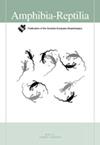Will climatic changes affect the Vietnamese crocodile lizard? Seasonal variation in microclimate and activity pattern of Shinisaurus crocodilurus vietnamensis
IF 1.3
4区 生物学
Q3 ZOOLOGY
引用次数: 3
Abstract
Climate change is considered to negatively affect vertebrate biodiversity. Lizards in tropical regions are considered particularly vulnerable due to their narrow temperature tolerances. The crocodile lizard Shinisaurus crocodilurus, an ecologically specialized semiaquatic species, is under the risk of extinction due to habitat loss and overharvesting. It is only found in isolated relict populations in southern China and northern Vietnam. Data on the thermal niche of the species are crucial to assess its vulnerability to climatic changes. We developed a backpack system with temperature data loggers for S. crocodilurus in order to monitor the lizard’s temperature preferences in its natural habitat in Vietnam. We found that S. crocodilurus vietnamensis preferred a mean ambient temperature range of 24 ± 1°C (min-max: 22-31°C) at natural habitat sites, a far lower temperature amplitude compared to the recorded ambient temperature range at habitat sites. In its natural habitat, S. crocodilurus vietnamensis avoided in particular high temperatures, indicating the importance of constantly cool streams and intact vegetation for the provision of shade and shelter. We further provide first insights into the seasonal variation in microhabitat use and activity of S. crocodilurus vietnamensis based on data from individuals kept in outdoor enclosures under natural climatic conditions in Vietnam, collected daily over a period of eight months. Our results aim to aid further conservation measures for the species, such as the identification and protection of core habitat sites and sites for restocking, as well as to adjust and improve conservation breeding programs for the species.气候变化会影响越南鳄蜥吗?越南鳄鱼小气候和活动模式的季节变化
气候变化被认为会对脊椎动物的生物多样性产生负面影响。热带地区的蜥蜴由于其较窄的温度耐受能力而被认为特别脆弱。鳄蜥鳄蜥是一种生态特殊的半水生物种,由于栖息地的丧失和过度捕捞,它正面临灭绝的风险。它只在中国南部和越南北部的孤立遗迹种群中发现。关于该物种热生态位的数据对于评估其对气候变化的脆弱性至关重要。为了监测鳄鱼在越南自然栖息地的温度偏好,我们为鳄鱼开发了一个带有温度数据记录器的背包系统。我们发现,越南鳄类在自然栖息地的平均环境温度范围优选为24±1°C(最小-最大:22-31°C),与栖息地记录的环境温度范围相比,温度幅度要低得多。在其自然栖息地,越南鳄避开了特别是高温,这表明了持续凉爽的溪流和完整的植被对提供阴凉和遮蔽的重要性。我们根据在越南自然气候条件下每天收集的户外围栏中个体的数据,在八个月的时间里,进一步首次了解了越南鳄的微栖息地使用和活动的季节变化。我们的研究结果旨在帮助该物种采取进一步的保护措施,如确定和保护核心栖息地和重新进货的地点,以及调整和改进该物种的保护繁殖计划。
本文章由计算机程序翻译,如有差异,请以英文原文为准。
求助全文
约1分钟内获得全文
求助全文
来源期刊

Amphibia-Reptilia
生物-动物学
CiteScore
3.10
自引率
6.20%
发文量
39
审稿时长
6-12 weeks
期刊介绍:
Amphibia-Reptilia is a leading European multi-disciplinary journal devoted to most of the aspects of herpetology: ecology, behaviour, evolution, conservation, physiology, morphology, paleontology, genetics, and systematics.
Amphibia-Reptilia publishes high quality original papers, short-notes, reviews, book reviews and news of the Societas Europaea Herpetologica (SEH). The Societas Europaea Herpteologica (SEH) website is located at: www.seh-herpetology.org.
 求助内容:
求助内容: 应助结果提醒方式:
应助结果提醒方式:


